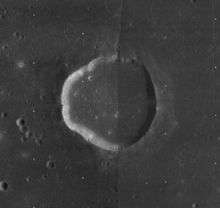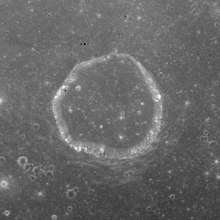Maclear (crater)
Maclear is a lava-flooded crater on the northwest part of the Mare Tranquillitatis, a lunar mare in the eastern half of the Moon. Its diameter is 20 km.[1] The crater is located to the southwest of the slightly larger Ross. To the southwest of Maclear is Sosigenes, while farther to the south-southeast is Arago.
 mosaic of Lunar Orbiter 4 images | |
| Coordinates | 10.5°N 20.1°E |
|---|---|
| Diameter | 20 km |
| Depth | 0.6 km |
| Colongitude | 340° at sunrise |
| Eponym | Thomas Maclear |

With most of its interior submerged in deposits of basaltic lava, all that remains of this crater is a narrow rim projecting above the surrounding mare. The rim is not quite circular, having a flat outward bulge along the western side. But the rim is relatively uniform in width and is not significantly eroded.
The crater rim lies at the southern terminus of a rille belonging to a system that runs along the western edges of Mare Tranquillitatis. The rille system to the north of the crater is designated Rimae Maclear, while the rilles to the south-southwest are named Rimae Sosigenes. The Rimae Maclear stretches for about 100 kilometers, reaching Al-Bakri to the north along the edge of the mare.
It is named after Sir Thomas Maclear,[1] Her Majesty's astronomer at the Royal Observatory, Cape of Good Hope (Cape Town, South Africa), from 1833 to 1870.
Satellite craters
By convention these features are identified on lunar maps by placing the letter on the side of the crater midpoint that is closest to Maclear.
| Maclear | Latitude | Longitude | Diameter |
|---|---|---|---|
| A | 11.3° N | 18.0° E | 5 km |
References
- "Maclear (crater)". Gazetteer of Planetary Nomenclature. USGS Astrogeology Research Program.
- Andersson, L. E.; Whitaker, E. A. (1982). NASA Catalogue of Lunar Nomenclature. NASA RP-1097.CS1 maint: ref=harv (link)
- Bussey, B.; Spudis, P. (2004). The Clementine Atlas of the Moon. New York: Cambridge University Press. ISBN 978-0-521-81528-4.CS1 maint: ref=harv (link)
- Cocks, Elijah E.; Cocks, Josiah C. (1995). Who's Who on the Moon: A Biographical Dictionary of Lunar Nomenclature. Tudor Publishers. ISBN 978-0-936389-27-1.CS1 maint: ref=harv (link)
- McDowell, Jonathan (July 15, 2007). "Lunar Nomenclature". Jonathan's Space Report. Retrieved 2007-10-24.CS1 maint: ref=harv (link)
- Menzel, D. H.; Minnaert, M.; Levin, B.; Dollfus, A.; Bell, B. (1971). "Report on Lunar Nomenclature by the Working Group of Commission 17 of the IAU". Space Science Reviews. 12 (2): 136–186. Bibcode:1971SSRv...12..136M. doi:10.1007/BF00171763.CS1 maint: ref=harv (link)
- Moore, Patrick (2001). On the Moon. Sterling Publishing Co. ISBN 978-0-304-35469-6.CS1 maint: ref=harv (link)
- Price, Fred W. (1988). The Moon Observer's Handbook. Cambridge University Press. ISBN 978-0-521-33500-3.CS1 maint: ref=harv (link)
- Rükl, Antonín (1990). Atlas of the Moon. Kalmbach Books. ISBN 978-0-913135-17-4.CS1 maint: ref=harv (link)
- Webb, Rev. T. W. (1962). Celestial Objects for Common Telescopes (6th revised ed.). Dover. ISBN 978-0-486-20917-3.CS1 maint: ref=harv (link)
- Whitaker, Ewen A. (1999). Mapping and Naming the Moon. Cambridge University Press. ISBN 978-0-521-62248-6.CS1 maint: ref=harv (link)
- Wlasuk, Peter T. (2000). Observing the Moon. Springer. ISBN 978-1-85233-193-1.CS1 maint: ref=harv (link)